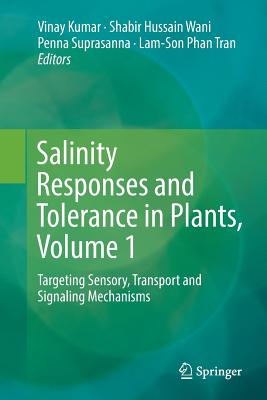Molecular Response and Genetic Engineering for Stress in Plants, Volume 2
暫譯: 植物壓力的分子反應與基因工程,第二卷
Shukla, Pawan, Kumar, Anirudh, Kumar, Rakesh
- 出版商: IOP Publishing Ltd
- 出版日期: 2025-05-01
- 售價: $4,170
- 貴賓價: 9.5 折 $3,962
- 語言: 英文
- 頁數: 290
- 裝訂: Hardcover - also called cloth, retail trade, or trade
- ISBN: 0750349247
- ISBN-13: 9780750349246
-
相關分類:
物聯網 IoT、生物資訊 Bioinformatics
尚未上市,歡迎預購
商品描述
Plants are confronted with various environmental stresses, the most prominent of which is biotic stress, which results in yield losses. Biotic stresses include damage caused by microorganisms like bacteria, viruses, fungi, parasites, insects, weeds, and native plants. It occurs to variable degrees in almost all agricultural ecosystems globally. Fungi, bacteria, or viruses may not be present in a given year, although they usually reduce output in the majority of years. Due to changing environmental conditions, plants struggle to attain their full genetic potential for growth and reproduction. This book focuses on understanding the physiological, biochemical, and molecular changes in stressed plants and the mechanisms underlying biotic stress tolerance in plants.
Key Features:
- Explains the different molecular mechanisms and genetic engineering strategies which have been developed and adopted to cope with consistent environmental changes and global climate change.
- It explores the latest developments concerning abiotic and biotic stress response at the molecular level for the improvement of crop quality and sustainable agriculture.
- It presents an exploration of the challenges and conceivable solutions to improve yields of the staple of food crops using data on agricultural sciences and omics technology.
- It discovers how the better understanding of molecular mechanisms of plant response to different stress would be used to improve the quantitative and qualitative features of crop plants and allied areas.
- There will be an inclusion of end-of-chapter problems and case studies.
商品描述(中文翻譯)
植物面臨各種環境壓力,其中最突出的就是生物壓力,這會導致產量損失。生物壓力包括由微生物如細菌、病毒、真菌、寄生蟲、昆蟲、雜草和本地植物造成的損害。這種情況在全球幾乎所有農業生態系統中都會以不同程度發生。雖然在某些年份可能不會出現真菌、細菌或病毒,但它們通常會在大多數年份中減少產量。由於環境條件的變化,植物難以達到其完整的基因潛力以進行生長和繁殖。本書專注於理解受壓植物的生理、生化和分子變化,以及植物對生物壓力耐受性的機制。
主要特點:
- 解釋為應對持續的環境變化和全球氣候變化而開發和採用的不同分子機制和基因工程策略。
- 探討有關非生物和生物壓力反應的最新發展,特別是在分子層面上,以改善作物質量和可持續農業。
- 介紹利用農業科學和組學技術數據來改善主要糧食作物產量的挑戰和可能的解決方案。
- 探索對植物對不同壓力反應的分子機制的更好理解如何用於改善作物植物及相關領域的定量和定性特徵。
- 每章將包含問題和案例研究。










